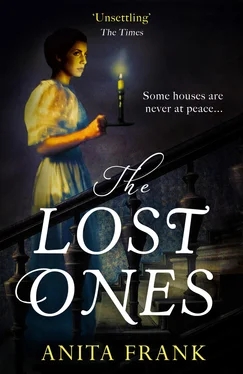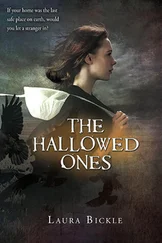‘Were you just in my room?’
‘I wasn’t, miss.’
‘Was anyone else?’
Her eyes skidded again towards the empty staircase before meeting mine. ‘No, miss.’
Her curious behaviour aroused my suspicion, but I could see nothing amiss. The mahogany steps rose steeply, siding onto a wall lined with paintings, before opening out onto a short galleried landing, which hosted two doors set in the wall facing me, while the landing itself ended rather abruptly with a further half-glazed door. My damp palm cupped the newel post. I was surprised at how cold it felt. I mounted the first step, focused on the landing above. I had an irresistible urge to explore. I took another step, the wood creaking as it took my weight. An icy draught brushed my cheek sending a shiver down my spine. I took another step and then another until I reached the collection of small oil paintings that hung above me.
Most of them were whimsical rural scenes – sheep being driven down muddy country lanes; a milkmaid sitting with her ruddy cheek pressed to a cow’s side, her fingers closed on its teats. But as I drifted on, I came upon a much larger painting in an exquisitely carved, gold leaf frame. I stopped. I was acutely aware of Annie’s inquisitive gaze as I tilted my head back to appreciate the striking work of art. It was a portrait of an angelic young boy, his cheeks rosy, blond curls looping round his petite ears, his blue eyes soft and loving, his rosebud mouth prettily pursed. Dressed in a blue sailor suit, his right hand rested on a metal hoop, whilst the fingers of his left brushed the head of the King Charles spaniel that was looking up adoringly up its master with bulging brown eyes. There was something about the portrait that was both touching and totally entrancing.
‘Stella!’
The urgency in Madeleine’s voice sliced through the air, startling me from my strange captivation. She stood stock-still outside her bedroom door.
‘Come down, Stella. There’s nothing to see up there.’
I was unwilling to tear myself away from the portrait. ‘Who is this painting of, Madeleine? Is it someone in the family?’
‘Come down, Stella, will you?’
I felt a devil of resentment inside me as I began my descent.
‘Is he one of the family?’ I persisted.
Annie was standing meekly with her hands clasped before her, but her eyes strayed to Madeleine, as if she too were curious to hear the answer. Madeleine fidgeted, folding her arms across her body, hugging them to her.
‘Yes,’ she answered as I reached the last step. She visibly relaxed as my feet finally settled on the carpeted landing.
‘Who is it? It’s a charming portrait.’
‘It’s Lucien.’
‘Lucien?’
‘Hector’s half-brother, Lucien Brightwell.’
‘I didn’t know Hector had a brother.’
‘Half-brother,’ she corrected me. She was clearly reticent about providing more information, but I pressed her for it. ‘His mother was Sir Arthur’s first wife, she died in childbirth. Lucien died of influenza just after Hector was born.’
I always remember my grandfather advising me to pay attention to the silences in a conversation, rather than the words. When I asked him why, he had removed his ever-present pipe and bestowed his wisdom upon me. The things that are most important are often left unsaid – they fill the pauses, he explained, the rest is often inconsequential. As I stood now observing my sister’s uncomfortable silence, I knew there was a lot more to be gleaned – a story she did not want to share – and I couldn’t help wondering what and why. I had never known her to exclude me from a secret, yet since my arrival at Greyswick I couldn’t dispel the feeling that Madeleine was hiding many things from me, and I feared no good would come from it.
‘Mrs Henge will be ringing the gong soon,’ she said. ‘We really ought to get on.’
‘What rooms are up there, Madeleine?’ She had been most determined to steer me away from what lay beyond the staircase and I wanted to understand her reason.
‘Nothing of importance.’
‘Just an entrance to the servants’ quarters.’ Annie’s interjection startled us both. ‘And, of course, the old school room – and nursery.’ Her lowered lashes fluttered up as she spoke. ‘Or so I believe, miss.’
Madeleine glared at her. ‘That’s right,’ she said, her voice discordant, like an overstrung instrument. ‘But I do not like them. I have chosen a room on this floor for a nursery. And that’s that.’
‘Well, that’s your prerogative I would have thought,’ I replied.
‘Yes, yes, it is. Now really, we should get ready for dinner. Lady Brightwell does hate to be kept waiting. I must ring for Maisie.’
And before I could say anything more, she disappeared into her room, closing the door firmly behind her, leaving me to examine the pregnant pauses left in her wake.
The next morning the heavens opened, and the winds whipped up a fury, dashing rain against the windows and rattling the sashes, as if furious to be denied entry. Madeleine and I settled ourselves in the library to write letters, as there was no chance of us escaping the confines of the house in the face of such onslaught.
Like the rest of Greyswick, the library was a room designed to impress. Its enormous windows were draped in excessive quantities of gaudy material, quite inappropriate given the nature of the room, and the bookcases which lined every square inch of wall had been specially commissioned, as had the large oak reading tables at which Madeleine and I now sat.
After finishing my first letter – one to Mother – I drifted around the room, my fingers running across the ornate bindings of books that ranged in subject from theological texts to fashionable scientific theories. Having drawn out a few to investigate further, however, I noticed that none of the pages had been slit: the books were unread. Like so much else in Greyswick, it appeared they were merely for show.
I was next attracted to a large glass case containing a display of stuffed birds, arranged against a backdrop of dried grasses, gorse and fern. I was not generally a great admirer of taxidermy, but the exhibit was striking, and demanded my scrutiny. A large coot took centre stage, overshadowing a white-throated dipper, whilst behind it, a small falcon had swooped down upon a chaffinch, whose beak was open in distress, its wings raised in fruitless defence. The magpie and mistle-thrush positioned on an angled branch at the back of the case showed no interest in the poor creature’s predicament – instead their black eyes appeared focused on me. But it was the beautiful bird clinging to the furthest fork of the branch that evoked my sharp intake of breath.
A kingfisher gazed out through the glass side of the cabinet, his dagger-like bill elevated, his golden chest puffed with pride as he turned his stunning blue back on the display’s other subjects. I pressed my fingertips to the glass.
‘Halcyon days …’ My brow creased as a bittersweet memory flooded my mind. I closed my eyes, fighting against the pain, to savour it.
It was the summer of 1913 and a letter had arrived from my godmother, asking whether I remembered Gerald Fitzwilliam at all. I did, of course, though I hadn’t seen him for years. His family had moved to Australia not long after Lydia died, and though Aunt Irene referred to him in passing every now and then, he had rather slipped from my mind.
I still had his letter, though, the one he sent me just after Lydia’s death. It was the sweetest thing. He wrote to say how sorry he was, and how he hoped I was bearing up, though he realised I must be hurting terribly. He had gone on to say how Lydia had been one of only two girls in his acquaintance whose company he had always enjoyed (in brackets he had assured me that I was the other one. He had made no mention of Madeleine).
Читать дальше











